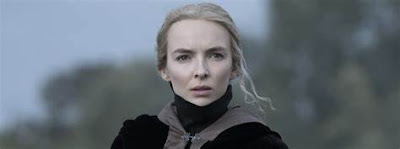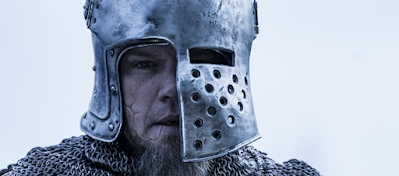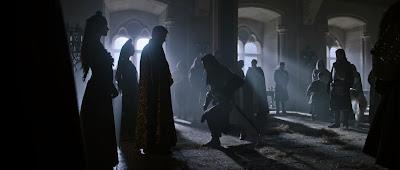2021
Directed by Ridley Scott
Written by Matt Damon, Ben Affleck, and Nicole Holofcener (based on the book The Last Duel: A True Story of Trial By Combat In Medieval France by Eric Jager)
So, my complaint about The Last Duel... actually, my complaint is that it's a 21st Century Ridley Scott Period Piece (by which I mean, a Ridley Scott Period Piece made in the 21st century, not Blade Runner). I generally like Ridley Scott Period Pieces—Gladiator is about as good as history-optional Roman times sword-and-sandalry gets, and Kingdom of Heaven, now fully rehabilitated as a minor classic, is probably as good as hand-wringing movies about Crusaders and religious extremism get—but The Last Duel really leans into all of its filmmaker's most unlikeable fixed ideas, this time to the point of diminished returns; it is, I'm almost certain, the utmost expression of the always-kind-of-annoying geographic zoning in the color correction that Scott's habitually enforced upon all his poor cinematographers (usually John Mathieson in the aughts, and usually Dariusz Wolski these days), so that anything north of the 40th parallel is "blue" and anything below "yellow," though in The Last Duel we don't ever leave France, except to go to Scotland.
It's probably not substantially "worse" than Mathieson's similar rendition of France in Kingdom of Heaven, or Germany in Gladiator, except in those movies we only spend about half an hour in Northern Europe before getting to the Levant or Italy, and therefore to "yellow," and frankly Scott Yellow is simply much nicer to look at than Scott Blue. (Counterpoint: Wolski's Exodus: Gods and Kings. But still, nicer.) Scott Yellow at least allows other colors to exist, and generally feels like a mood rather than an imposition. Scott Blue, this time around, is an endless miasma, a milky blue-gray haze, and so while there are some very occasional interesting interactions of tawny firelight and the blue treatment that Scott's decided to use in, more or less, every last frame of a 153 mintue film, what it resembles more than anything is just bad day-for-night shooting, and if that sounds fittingly dreary—it's the whole Medieval Times notion he's going for, after all—it's also drearily tiresome. I mean, it's generally well composed: if Scott wants to make a movie in monochrome, could somebody tell him that black-and-white photography still exists? That's probably too much to ask for a movie oft-described as "big-budget" (though I can't find a budget for it, and it doesn't really look big-budget, with most of its story taking place in, like, rooms, or else in front of still-extant medieval buildings); but if we can't do this in black-and-white, and Scott won't consent to doing it in actual color, can we at least cut the line where a character is described as having picked up a tan on a planet that appears to be in orbit around a dying star?
My other big complaint is not nearly so big, and I don't want you to think this makes The Last Duel "bad," though it does lock its story onto precisely one inescapable path, and everyone involved seems perversely proud of how little you need to even watch the thing in order to "get" it. I probably overuse the adjective, "schematic," and I don't always mean that negatively, but this time I mean it in a purely denotative sense, for The Last Duel, based on Eric Jager's pop history of the last judicial duel in France, really was constructed as a writing exercise in perspective and gender between its screenplay's three authors, Matt Damon, Ben Affleck, and Nicole Holofcener. The movie's a triptych about the lot of women in the Middle Ages and, more to the point, the lot of women today, and they've made a big show about how they split up the screenplay between them, each sticking mainly to their own sections which, in turn, each take on the particular point-of-view of one of their central characters.
It's not unlike Rashomon, said the critic who can only write in tired clichés, though it's unlike Rashomon in that it actually is about subjectivity—well, sort of, but hold on—and also because, rather surprisingly, it doesn't use the framing narrative of a trial, despite the whole film being, in its alienating, medieval way, a legal procedural. It doesn't use any framing narrative at all, in fact, besides a flash-forward prologue that exists just to remind you that eventually two dudes in armor are going to get around to wailing on each other, and when we get back to it there's no sense that we're seeing this through any other eyes than those of Ridley Scott, Hollywood's premier pummeler of dudes in armor. Otherwise, it presents its anthology of perspective as one "take" after the other, not as stories being told to some audience, and therefore subject to conscious manipulation, but presumably "objective" in the sense that each one is what its story's participants objectively believe happened.
Those participants, then, are Jean de Carrouges (Damon), Jacques Le Gris (Adam Driver), and Jean's wife, Margeruite (Jodie Comer). The former two start off as fast friends and squires in the Kingdom of France in the late 14th century, though Jean eventually achieves a knighthood on a campaign against the English on the basis of his battle-hardiness. In the meantime, however, he has shown little skill in any other endeavor—he's illiterate, he's boorish, and he's almost absurdly inept politically and socially—and hence Jacques has leapfrogged in the estimation of their liegelord, Count Pierre d'Alcenon (Affleck, who strategically retreated from playing Jacques, the character he wrote, for reasons that I expect shall shortly clarify themselves). As a result, Jacques has become the recipient of all the Count's favors, while Jean suffers all the obligations, and Jean nurses his resentment.
At a certain point in Jean and Jacques's checkered relationship, Jacques gets it into his head that he loves Marguerite, and as she's suffering silently as the wife of a dull brute, and as he (so he fancies himself) is the most desirable and charming man in France, it seems elementary that she would love him back if he gave her the chance. Thus he tricks Marquerite into letting him into her home while Jean's away; and, in the aftermath, she claims that he raped her. He claims he didn't, and when Jean finds no justice in a court run by Jacques's best friend, he brings his case before Charles VI (Alex Lawther), invoking his right to a duel to settle the truth of the matter. The king is surprised to find that trial by combat is even still on the books—there hasn't been one in his lifetime—but eagerly endorses Jean's petition and makes it an enormous celebration. The downside is that, logically, if Jacques wins, that means Marguerite wasn't raped but instead must have lied under oath—and so if Jean loses his duel, her life is forfeit too, leaving her rape-born child an orphan.
There is, almost needless to say, absolutely no overt ambiguity to any of this; for good or ill, an ambiguous film on this topic would not exist in 2021, and The Last Duel makes its villains' counter-narrative so idiotic and incoherent that it's mildly grating. Likewise, The Last Duel opens up each of its three chapters with a "truth according to" intertitle, white on black, and "the truth" hangs in the void for a really, unmissably long time after the rest has vanished during the opening of "the truth according to Marguerite," which should give you a sense of the hammer that Scott's bringing to the project, as well as the way its arc bends towards a flat essentialism. (Cynically, you could say that Damon and Affleck, who came up with the basic plan, brought on Holofcener for equal parts insight and ass-covering, but Holofcener's a strong writer and her participation would have value in any event; on the other hand, taking this to the Geena Davis Institute for vetting seems like a waste of time, unless there was a draft much less afraid of the briar patch than this one.)
For all that, I admire the almost-embarrassing bluntness of the "metaphor" Scott brings out in the form of a black stallion viciously mounting Jean's white mare against Jean's wishes (for it, too, is his property—do you get it?), though I'd admire it more in a movie that hadn't already verbally instructed me exactly how I'm supposed to feel about its material somewhere between eight and twenty times. As I lengthily implied, Scott expended zero effort on distinguishing between his three perspectives aesthetically, at least beyond slight differences in action and shot choice that were either already blocked out for him in the script, or were otherwise obvious (e.g, probably the longest single take in a somewhat raggedly-edited film is Driver's extended o-face at the end of his "no means yes" sequence; the corresponding sequence, taking on Marguerite's perspective, naturally attends to Comer's expressions of violation, so, that's fine, but we're not talking genius). I'm also inordinately bothered by a sex dream sequence in Jacques's chapter, when the film never delves beyond its respective protagonists' conscious perceptions anywhere else.
The good news is that, in the absence of any ambiguity, let alone any potential for being unpredictable, it's a solidly-crafted example of what it's best at, which is a character study situated in a world that isn't ours. (Actually, what it's best-best at is what Scott is best at, which is combat, and the titular last duel is a great piece of Scottian sword-and-armor play, a stately ritual that degenerates very quickly into ad hoc, animalistic brutality; still, the most inspired action beat of the film comes much earlier in Normandy, when Jean impales an Englishman on a pike in a move I don't think I've seen before, by jumping on his shoulders and shoving his neck downward through it.) In the former regard, anyhow, The Last Duel, just for starters, has almost no right to be as not-boring as it is, given its long runtime and triplicated structure, and if I wanted to praise its writers for nothing else, it's miraculous that it manages to have virtually not one piece of redundancy between their three sequences. Even the (ahem) "centerpieces" bear enough differences to be interesting, with the first arriving as an almost-cutesy DS scene with "the customary protests," albeit stained through with the film's awareness that you didn't just accidentally walk into the wrong theater; the second is almost clinical, just sitting there coldly and unpleasantly, smartly calling into question why "dominance" could've seemed sexy in the first place without being a jerk about it.
Curiously, the biggest successes of The Last Duel are almost entirely besides its point, and these come through a genuine engagement with the social codes of a bygone era, presenting the divergent (and divergently-effective) ways that three very different characters navigate a culture that hasn't yet figured out that power should at least pretend not to be arbitrary and corrupt. It's a little weak on actual law or the broader complexion of society (my spouse noted that for a movie called The Last Duel it seems extremely disinterested in the wider phenomenon of dueling), and it kind of forgets that by the late 14th century, trial by combat was not normal. But it's shockingly interested in feudalism for a movie that's predominantly interested in being a MeToo allegory.
That it works so well in this mode is a testament to the performances—I honestly hate to say it—of the men, especially Damon, who's required to range the most across the three segments while still maintaining the same "objective" core of his character as a slow-witted dolt prone to rages; remarkably, Jean's a more sympathetic character as seen through Jacques's eyes than he is when he's painted with his own ego-soothing self-regard, because Jacques sees him, uncut, unedited, and unpolished, as everybody else sees him, an inarticulate and inflexible squarehead barely capable of getting through a sentence without sputtering incoherently, and so pitifully insecure that he can't even insist upon his dignity without automatically losing it.
As for Driver, he's entered the Scarlett Johansson In the Early 10s phase of his career, actively pushing back against his status as a hot celebrity by using "hot celebrity" as a blind, taking on gross, ugly roles that, besides simply allowing him to ply his craft as a serious actor, might finally get people to stop fantasizing about him sexually; the short version is he's sickeningly credible as a man who believes he effectively can't rape people, because they're always willing. Affleck, meanwhile, is soaking up all the actual attention, because people are idiots easily distracted by shiny hair; but he is the showboat here, and Pierre is such an insufferable evocation of privilege that he wheels back around to being funny, like the bully in an 80s film. It's a great performance anyway, and one that leavens a picture that otherwise can only find joy in violence. (Which isn't a bad thing: Lawther's king's freakish enthusiasm for the duel is also a blast.) And Comer is...
Comer is, at least, perfectly okay in a saintly Victim of Everything role that allows "being raped and oppressed" to be more-or-less the entire character. Actually, she's perfectly great in Jacques's segment, which requires her to tint Jacques's perception of a winking attraction to the squire with the "real" character's underlying disquiet and disgust. But Jean's segment has very little to offer her, and then we get to segment 3, which only has a more defined single dimension for her to play. Yet even so, I'm actually not sure if Holofcener isn't outsmarting everybody on this one.
So, "the truth" notwithstanding, she might very well be extending to Marguerite the same tendency people have towards making themselves the hero of their own story, just like Damon and Affleck are much more obviously doing with Jean and Jacques. There's a faint sense that Holofcener could be mocking, for example, Marguerite's girlboss satisfaction over being able to read, count, and successfully oversee an estate on which her husband's serfs do all the actual labor; it's possible she might even be poking gingerly at the limitations of self-righteousness in a nasty, barbaric world, explaining how Marguerite remains devoid of much convolution till she finally figures out that her rape has been exploited by her dumbshit husband for his own agenda. On the other hand, all the irritating stuff is in segment 3, not least the repeated insistence that in the middle ages people believed women simply weren't capable of conception unless they liked the sex, whereupon Holofcener evidently had to stop herself from just typing out "the body has a way of shutting that down" without alteration. The first two segments aren't sinless, but they don't so blatantly roll their eyes (and even when they do veer into anachronism, when Affleck's its vehicle, it feels more appropriate, as he almost comes off like a time traveler returned to enjoy a more robust patriarchy anyway). Well, all along, The Last Duel's grappled with one big inherent handicap. By design, its characters can only ever be props in each others' stories; but Marguerite's a prop in her own, and if that's intentional, that's terribly interesting. Probably, it's not.
Score: 7/10




I too would describe this film as solid drama, though it would be interesting to see if the film might be improved by a cut that simply tells the story without the shifts between PoV.
ReplyDeleteI’m also stone cold certain that if a GRR Martin adaptation is looking for an Aegon the Unworthy they absolutely MUST give Mr Ben Affleck the privilege of first refusal.
In this film he even has the hair colour!
I dunno. It would sort of lose itself, I think (and might also wind up like 60 minutes long); I've had it sitting around on a shelf for a while but haven't been moved to rewatch it, but my recollection is that it just needs a bit more *something*, beyond the "she has accurately reported the circumstances of her assault, which you knew going in because we told that's what the movie was about," for the third chapter.
DeleteAs for Aegon IV, see, it's a pity my superfan spouse is on a trip and couldn't ask her, because I assumed until I was halfway through his fan wiki entry that was the guy from House of the Dragon. His dad has the same name!
DeleteKinda wish that Daemon In the Show was Ben Affleck.